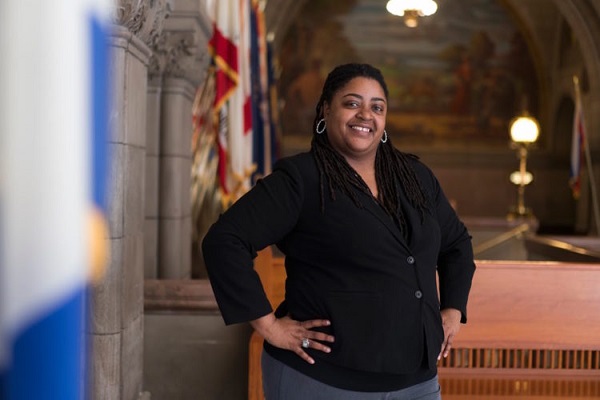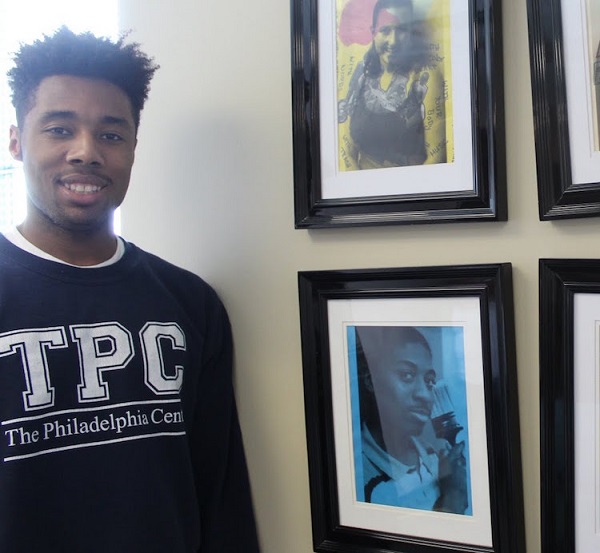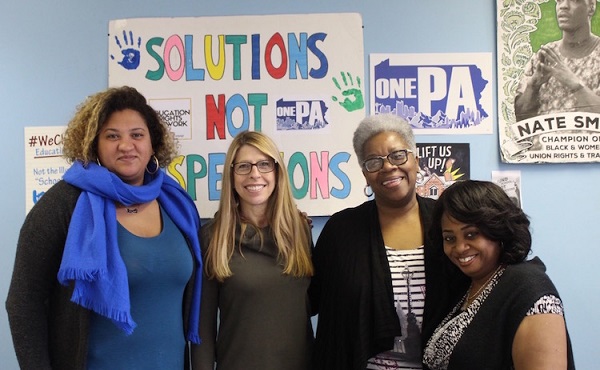
Pittsburghers helping to stop the school-to-prison pipeline
Above photo: Tiffany Sizemore runs the Juvenile Defender Clinic and Education Law Clinic at Duquesne University’s School of Law. Photo courtesy of The Pittsburgh Foundation.
This story was first published in NEXTPittsburgh.
“A form of slavery all over again.”
That’s how Paulette Foster describes the cycle of trauma, exclusion and criminalization that students — particularly students of color — endure in American schools.
“It’s systemic,” says the co-founder of Pittsburgh’s Education Rights Network, which organizes parents for disability and racial equity in public schools. “You have children coming to school who are hungry, who are homeless, who are uneducated. And when you suspend them, you’re keeping them that way.”
Indeed, suspensions, expulsions and school referrals to law enforcement have long been linked to negative outcomes, from lower test scores to higher drop-out and incarceration rates. And to a stunning degree, the use of such measures disproportionately affects minority students — according to national data, black children are almost four times more likely to be suspended than their white peers, despite research finding that neither group commits more frequent or more serious offenses than the other.
They’re also far more likely to be incarcerated: In 2012, the rate of detention for black youth in Allegheny County was 19 times higher than that of white youth. The statistics are even worse for kids with disabilities.
This school-to-prison pipeline runs straight through the Pittsburgh region. Poverty, racism and years of inequitable funding have created schools with lots of need but few resources, activists say. These are schools where probation officers outnumber guidance counselors and a culture of zero tolerance treats minor infractions as serious crimes.
The consequences can ruin lives: Once students enter the justice system, it can be all but impossible to get out. Activists regularly trade stories of dreams dashed in juvenile detention, of adults denied jobs because of years-old records, and of families who face eviction when a child is judged delinquent.
In the face of mounting moral, social and economic costs, Pittsburghers are pushing back. They are students, educators, lawyers and parents, and they’re working to sever the pipeline for good. But changing minds is difficult work, they say —especially when they’re up against entrenched systems, implicit biases and the heavy weight of history.
What is happening right now in Pittsburgh?
“We know this story,” says Tiffany Sizemore, assistant professor at Duquesne University’s School of Law. She’s sitting in her office: a half-conference room, half-mock courtroom on the second floor of a brown brick building Uptown. “Judges, prosecutors, everyone in the system — we know this story. Because we’ve seen it happen over and over again.”
It goes like this: A student gets into trouble at school. Maybe he or she gets into a fight, or maybe it’s a smaller incident — the student is late for class or otherwise slow to comply — and it escalates. The school suspends the student and calls the police, referring the child to the juvenile justice system. If the student is age 10 older, officials can push the case into court and formally arraign the student.
“Students of color and kids with disabilities tend to get pushed deeper into the system and more quickly,” says Sizemore, “because it’s not set up to support them and the trauma that many of them bring. So instead, we institutionalize them.”
The numbers are startling. Though referrals have dropped by 40 percent since 2010, more than 3,300 young people encountered Allegheny County’s juvenile justice system in 2015, according to a report released by The Pittsburgh Foundation. Of those young people, more than 2,600 were detained in secure facilities. More than 70 percent were black. And 73 percent of referrals — many of which came from schools — were for nonviolent offenses.
Sizemore, a former public defender, shakes her head. “Those records can have consequences that most people don’t realize,” she says. “Kids are denied jobs, military service, public housing and driver’s licenses. At what point are we going to stand up and say, ‘This is insanity, and we’re not doing this to children anymore?’”
The question led her to launch two clinics at Duquesne Law: the Juvenile Defender Clinic and the Education Law Clinic. Founded in 2015, they serve separate but related goals, representing young people in matters of delinquency offenses, school discipline and special education.
Together, they provide free representation for low-income clients who couldn’t otherwise afford a private lawyer. With the help of professor and psychologist Dr. Tammy Hughes, Sizemore brings students of law, social work and school psychology together to provide holistic representation and support.
Today, they’re busier than ever, defending young people in court, expunging juvenile records and preparing kids to appear in front of judges. But the fact that there’s so much work, says Sizemore, speaks to problem’s severity.
“The bottom line is that schools have to stop suspending students for nothing at all. That’s where this all starts,” she says. “Look, kids push boundaries. They talk back. They have temper tantrums and slam lockers. These things are the nature of childhood.
“But in what world is it okay to put a seven-year-old in handcuffs? This isn’t court. This isn’t prison. It’s a school. And schools are supposed to be sanctuaries.”
How are students making a difference?
Students, of course, already know this. Just a few miles away in Pittsburgh’s Hill District, a group of high schoolers from around the city gathers in a conference room. It’s the first day of Spring break, but they’re not here to celebrate.
“Growing up and having some bad times in school, I want my younger brothers and sisters to have a better education and better schools than I had,” says Chris, a senior. [For confidentiality, NEXTpittsburgh is only using the students’ first names.] “I heard this saying from somebody: ‘Always leave something better than how you found it.’ I love that, and that’s what we’re here to do.”
Chris and his colleagues are members of TeenBloc, a coalition of high schoolers working to amplify student voices and create positive change in schools. Together, they’re developing a series of “teach-ins” — workshops for pre-service teachers at Duquesne, the University of Pittsburgh and elsewhere. The idea, says TeenBloc coordinator Brandon McClendon, is to help new teachers build stronger relationships with students, thus stopping the school-to-prison pipeline before it starts.

“A lot of times, the voices and experiences that black and brown students bring to the classroom aren’t fully valued or taken into consideration,” says McClendon. He and the TeenBloc students aim to change this by looking at the small, positive steps educators can take toward working with kids from a holistic perspective — one that considers students’ needs, aspirations and circumstances.
“Ultimately, we want to build trust and mutual respect,” he says, “because student-teacher relationships play the most vital role in the education experience.”
The TeenBloc students are surprisingly candid about craving those relationships. “If you have a good relationship with the students you have, and you notice they’re off or they’re acting a certain way, you can come to them nicely as a teacher and ask if they’re all right,” says one student, Jhaunea. “That student might open up to you.”
Another student, Jalen, says kids and adults need to work toward understanding one another. “My education, and the way I potentially live my life, is based on my experiences at school,” she says. “I want to show teachers that just because I’m different doesn’t mean I’m a bad student or a bad person.”
Her friend Michelle nods. “Schools have to take into consideration what goes on at home, too,” she says. “They send us straight to punishment without knowing what a child is going through just to get to school. They don’t know if a child is getting abused or not. They don’t know what happens. A lot of kids are really struggling.”
How can we give children the support they need?
Angel Gober, an organizer with One Pennsylvania, sees children struggling every day.
“People don’t understand what’s happening in a lot of families in this economy,” she says. “If a student’s basic quality-of-life stuff isn’t there, then you can kiss your test scores goodbye. You can kiss your reading levels goodbye. You’ll see more suspensions, more expulsions and more kids ending up in the justice system.”
It’s a reality that school districts are increasingly recognizing. Last year, Pittsburgh Public Schools launched a “community schools” pilot within the district, designating five schools to receive a host of “robust, wraparound services,” says LouAnn Ross, the district’s community schools coordinator. A designated employee at each site works with teachers, parents, social workers and nonprofits to provide academic enrichment opportunities, afterschool programs and behavioral supports.
The result, says Ross, is a slew of new support programs based on the needs of each school. At Langley K-8, for example, students can access a community closet stocked with donated clothes. The school has offered on-site immunizations so that students don’t miss class (and parents don’t miss work) for doctor’s appointments.
Elsewhere, the district has deployed extra nurses, librarians and others in an effort to meet students’ extracurricular needs. The district hopes to expand the model in the coming years, aiming to eventually provide services for students’ families and communities at large.
“We know that by meeting these needs, we can help our students succeed academically,” says Ross. “There’s mounting evidence that schools that implement this model put everyone in a better position to learn and teach.”
The district is also experimenting with “restorative practices” — strategies that address discipline through the building and repairing of relationships, rather than suspensions or expulsions — in more than 30 schools. Though a full evaluation of the program isn’t due until later this spring, Dr. Dara Ware Allen, the district’s assistant superintendent of student support services, tells the New Pittsburgh Courier that the district has already seen a drop in suspensions and “a narrowing of racial disproportionality.”
All of this is welcome news to Nina Esposito-Visgitis, president of the Pittsburgh Federation of Teachers. Stopping the pipeline “really comes down to needing supports in our schools,” she says. “No teacher wants any kid suspended. I cannot stress that enough. But when you have 30 kids in a classroom, you can’t always stop. So we need resources and people —paraprofessionals, counselors and mental health professionals — to make sure everyone is learning. Is there a cool down room? Is there a principal that helps out? Is there a counselor? We need those options.”
Parents and activists, meanwhile, continue to push for change.

What are we really teaching our children?
The Education Rights Network, which last year helped convince Pittsburgh Public Schools to ban most suspensions before third grade, hopes to see the ban go even further. “If a kid is suspended for three days and then comes back, what’s going to be different?” asks Pam Harbin, an organizer with the Network. “Nothing. It’s purely punitive. If anything, suspended children fall further behind academically and are more likely to find trouble while they’re out of school.”
As for the argument that reducing or banning suspensions would disrupt other students’ education, Harbin contends it’s important to look at the bigger picture. “Even the ‘good kids’ could come in with trauma one day and need extra services,” she says. “It’s better for all kids to have mental and behavioral supports in place.” (A new study backs her up: researchers found that in Chicago Public Schools, reducing out-of-school suspensions actually led to better test scores and attendance among the student body as a whole.)
Lately, though, activists’ work has grown more complicated. In the wake of the February 14 massacre that killed 17 people in Parkland, Florida, many worry that an increased demand for policing could send even more students into the school-to-prison pipeline, despite a lack of evidence that school resource officers make for safer schools.
That’s why the Education Rights Network helped launch a new campaign, #CounselorsNotCops, and why they’re spreading the word about the Network’s services, which include know-your-rights workshops and resources for families navigating the pipeline.
At Duquesne, “a lot of the schools that our cases come from — which are usually majority black and low-income — are already heavily policed and full of metal detectors,” says Sizemore. More emphasis on policing, she fears, will compound what’s already “an over-reliance on obedience, compliance and following orders. A lot of schools already feel like juvenile justice facilities. It’s like we’ve forgotten we’re dealing with children.”
It’s this forgetting — and the consequences it heaps on Pittsburgh’s children — that drives activists to keep making signs, to keep speaking up at school board meetings, and to keep bringing parents into the battle against the pipeline.
They’ve made it their mission to make us remember.
“What happened to compassion? What happened to caring? What happened to seeing every child as a person?” asks Paulette Foster. “Look past the color. Look at the child. Let’s do what needs done to develop children as citizens — to teach them to be members of society who can one day give back.”
“Otherwise,” she says, “you’re teaching them to be inmates.”